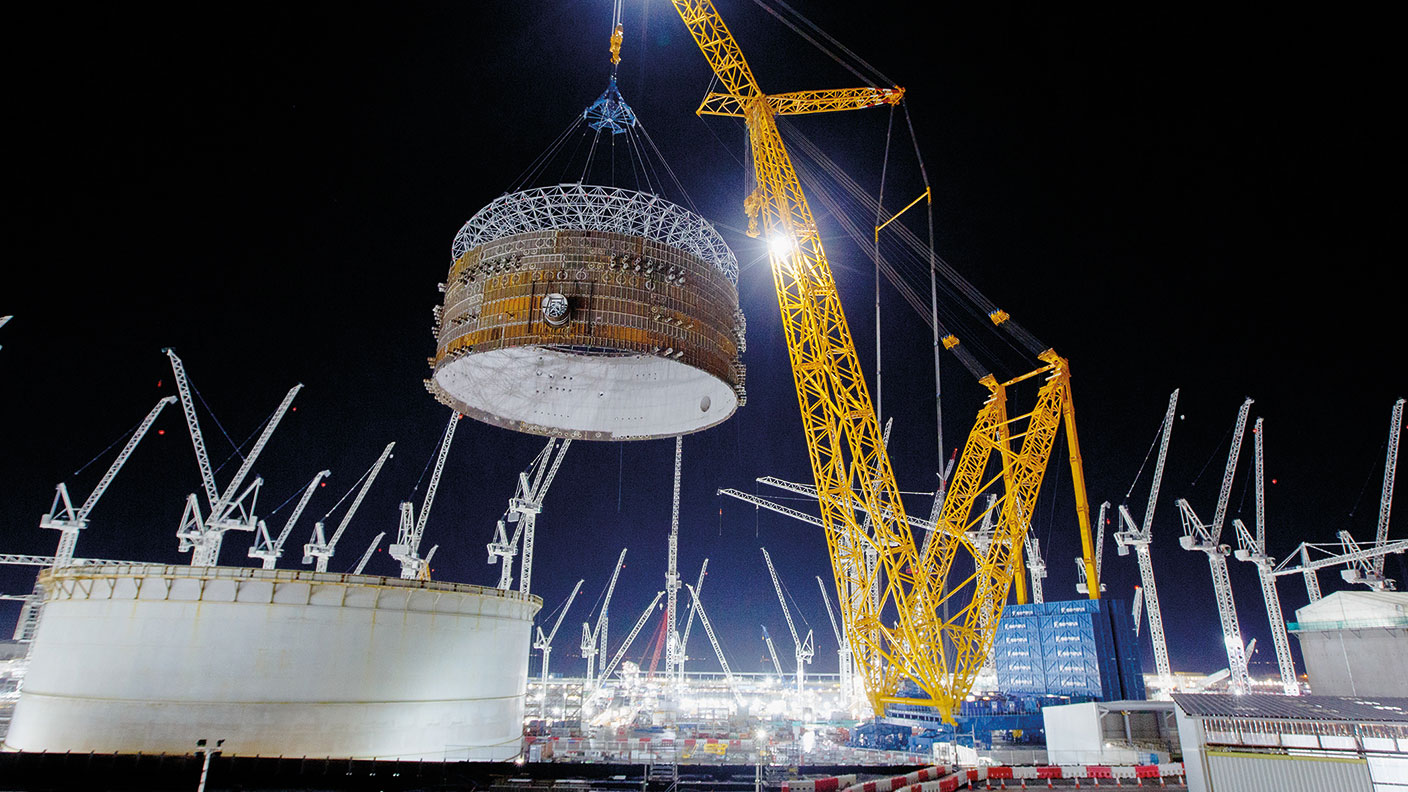Does nuclear power have a future?
Fears about safety have long hobbled the industry, particularly in the wake of Fukushima ten years ago. But the fears are overplayed and net-zero carbon goals look unachievable without it, says Simon Wilson.

Get the latest financial news, insights and expert analysis from our award-winning MoneyWeek team, to help you understand what really matters when it comes to your finances.
You are now subscribed
Your newsletter sign-up was successful
Want to add more newsletters?

Twice daily
MoneyWeek
Get the latest financial news, insights and expert analysis from our award-winning MoneyWeek team, to help you understand what really matters when it comes to your finances.

Four times a week
Look After My Bills
Sign up to our free money-saving newsletter, filled with the latest news and expert advice to help you find the best tips and deals for managing your bills. Start saving today!
Why the controversy?
Right from the beginning of nuclear power – the first commercial nuclear reactor was built at Windscale in Cumbria in 1956 – it was controversial due to issues of safety, cost and the long-lived and toxic waste it produces. Even so, nuclear energy continued to expand globally until the 1990s, since when it has all but flatlined. Then, ten years ago last month, the disaster at Fukushima dealt its reputation a body blow. Within days Angela Merkel, previously a strong backer of nuclear energy, ordered all of Germany’s reactors to be phased out. In China the world’s biggest programme of new nuclear plants was put on hold.
How much energy does nuclear provide?
Globally, nuclear power produces around 10% of the world’s electricity, making it the second-biggest source of low-carbon energy after hydroelectric power. But that’s a sharp drop from a peak of 18% in the mid-1990s. According to figures collated by Bloomberg, there are 440 nuclear reactors currently in operation, with a combined electrical capacity of 392 gigawatts (GW). Another 50 are under construction, adding around 15% to current capacity. But that’s not even enough to make up for the 25% of reactors due to be shut down in advanced economies by 2025. Nuclear accounts for a bigger slice in advanced economies – 18% rather than 10%, according to the International Energy Agency (IEA), making it the largest low-carbon source of energy. In the UK, for example, about 20% of current electricity capacity is nuclear. However, half of that is due to be retired by 2025, and all but one of the existing fleet of nuclear reactors is due to be taken offstream in the next ten years. Meanwhile, only one new plant, the 3.2 GW Hinkley Point C in Somerset, is being built, replacing just under 40% of current nuclear capacity.
So it’s in decline?
In most of the world, yes, with advanced economies due to lose two-thirds of their nuclear capacity by 2040. Proponents of nuclear power (including the IEA) argue that it is vital to the overall drive for net-zero carbon emissions by mid-century. Despite the impressive growth of solar and wind power, says the IEA, the overall share of clean-energy sources in total electricity supply in 2018, at 36%, was the same as it was 20 years earlier due to the decline in nuclear since the 1980s. “Halting that slide will be vital to stepping up the pace of the decarbonisation of electricity supply,” it says. Advocates argue that nuclear-power plants aid electricity security by keeping power grids stable and limiting impacts from seasonal fluctuations from renewables, and cutting dependence on imported fuels. In other words, nuclear has a vital role to play as reliable “firm generating capacity” during the decarbonising shift to renewables, and winding nuclear down for misguided safety reasons would be folly.
MoneyWeek
Subscribe to MoneyWeek today and get your first six magazine issues absolutely FREE

Sign up to Money Morning
Don't miss the latest investment and personal finances news, market analysis, plus money-saving tips with our free twice-daily newsletter
Don't miss the latest investment and personal finances news, market analysis, plus money-saving tips with our free twice-daily newsletter
But isn’t nuclear power dangerous?
The debate about that has long been a battle between those concerned more with climate-change warming (nuclear is carbon-free) and those worried about safety. For pro-nuclear environmentalists, the embrace of nuclear power by China and (to a lesser extent so far) India is cause for celebration. Advocates have long argued that, in terms of the number of people killed or harmed, nuclear power is far safer than other forms of power generation. Since its earliest days, nuclear accidents have killed one person every 14 years, proponents say. Indeed, in 2013, Pushker Kharecha and James Hansen calculated that, between 1971 and 2009, nuclear power saved the lives of 1.84 million worldwide thanks to reductions in air pollution.
But what about Fukushima?
The earthquake and tsunami that flooded Japan’s east coast ten years ago killed about 18,500 people. But the destruction of the three reactors of the Fukushima plant – the worst nuclear disaster since Chernobyl in 1986 – killed only one person as a result of radiation exposure. Moreover, a report on Fukushima released last month by the United Nations Scientific Committee on the Effects of Atomic Radiation (UNSCEAR) concluded that “no adverse health effects among Fukushima residents have been documented that could be directly attributed to radiation exposure”. Future consequences for health “are unlikely to be discernible” and there was “no credible evidence of excess congenital anomalies, stillbirths, pre-term deliveries or low birthweights related to radiation exposure”.
And Chernobyl?
The worst ever nuclear disaster was the result of human errors so “bizarre” that the scenario would have been “thought overambitious by a genuine saboteur”, says Dominic Lawson in The Sunday Times. The Soviet-era accident, which blew a 1,000-ton concrete reactor shield away in a mighty explosion, was the result of an insane experiment in which one of the reactors was made to run at a dangerously low level, the cooling unit disconnected and the safety mechanism switched off. It was feared deaths would run into the hundreds of thousands. In fact, “apart from the heroic Chernobyl emergency team, fewer than 100 deaths have been attributable to increased radiation – and no known birth deformities”, according to UNSCEAR.
So nuclear is safe?
It’s far safer than most people realise, says The Economist. China’s post-Fukushima pause on nuclear didn’t last long: it soon accelerated again and by 2019 produced four times as much as in 2011, with more expansion planned. There’s a strong case for countries such as Britain to follow China’s lead and import its technology. Moreover, modern smaller reactors with lower unit costs are a promising development that can make nuclear cheaper and more flexible. Nuclear power has its drawbacks, but to hasten its decline “is wilfully to hobble the world in the greatest environmental struggle of all”. The lesson of Fukushima is “not to eschew nuclear power, it is to use it wisely”.
Get the latest financial news, insights and expert analysis from our award-winning MoneyWeek team, to help you understand what really matters when it comes to your finances.
-
 Average UK house price reaches £300,000 for first time, Halifax says
Average UK house price reaches £300,000 for first time, Halifax saysWhile the average house price has topped £300k, regional disparities still remain, Halifax finds.
-
 Barings Emerging Europe trust bounces back from Russia woes
Barings Emerging Europe trust bounces back from Russia woesBarings Emerging Europe trust has added the Middle East and Africa to its mandate, delivering a strong recovery, says Max King
-
 Barings Emerging Europe trust bounces back from Russia woes
Barings Emerging Europe trust bounces back from Russia woesBarings Emerging Europe trust has added the Middle East and Africa to its mandate, delivering a strong recovery, says Max King
-
 How a dovish Federal Reserve could affect you
How a dovish Federal Reserve could affect youTrump’s pick for the US Federal Reserve is not so much of a yes-man as his rival, but interest rates will still come down quickly, says Cris Sholto Heaton
-
 Three companies with deep economic moats to buy now
Three companies with deep economic moats to buy nowOpinion An economic moat can underpin a company's future returns. Here, Imran Sattar, portfolio manager at Edinburgh Investment Trust, selects three stocks to buy now
-
 Should you sell your Affirm stock?
Should you sell your Affirm stock?Affirm, a buy-now-pay-later lender, is vulnerable to a downturn. Investors are losing their enthusiasm, says Matthew Partridge
-
 Why it might be time to switch your pension strategy
Why it might be time to switch your pension strategyYour pension strategy may need tweaking – with many pension experts now arguing that 75 should be the pivotal age in your retirement planning.
-
 Beeks – building the infrastructure behind global markets
Beeks – building the infrastructure behind global marketsBeeks Financial Cloud has carved out a lucrative global niche in financial plumbing with smart strategies, says Jamie Ward
-
 Saba Capital: the hedge fund doing wonders for shareholder democracy
Saba Capital: the hedge fund doing wonders for shareholder democracyActivist hedge fund Saba Capital isn’t popular, but it has ignited a new age of shareholder engagement, says Rupert Hargreaves
-
 Silver has seen a record streak – will it continue?
Silver has seen a record streak – will it continue?Opinion The outlook for silver remains bullish despite recent huge price rises, says ByteTree’s Charlie Morris